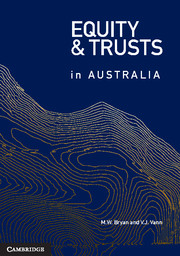Book contents
- Frontmatter
- Contents
- Preface
- Table of Cases
- Table of Statutes
- Abbreviations
- Part A Introduction
- Part B Equitable Remedies
- Part C Equity, Contract and Property
- Part D Equitable Obligations
- 10 Fiduciary Obligations
- 11 Participants in a Breach of Fiduciary Obligation
- 12 Breach of Confidence
- Part E Express Trusts
- Part F Performing the Trust
- Part G Breach of Trust
- Part H Non-Consensual Trusts
- Index
- References
10 - Fiduciary Obligations
from Part D - Equitable Obligations
- Frontmatter
- Contents
- Preface
- Table of Cases
- Table of Statutes
- Abbreviations
- Part A Introduction
- Part B Equitable Remedies
- Part C Equity, Contract and Property
- Part D Equitable Obligations
- 10 Fiduciary Obligations
- 11 Participants in a Breach of Fiduciary Obligation
- 12 Breach of Confidence
- Part E Express Trusts
- Part F Performing the Trust
- Part G Breach of Trust
- Part H Non-Consensual Trusts
- Index
- References
Summary
Introduction
Equity closely scrutinises relationships in which one party places trust and confidence in another. There are many examples of trust in human interaction, but equity cannot grant relief against every breach of trust and confidence, any more than contract law can enforce all promises. Only some trusting relationships and some obligations of confidence are protected. The relationships which equity protects are known as fiduciary relationships.
A relationship of trust and confidence will be recognised as fiduciary where it arises from F undertaking to act in the interests of B in a matter which confers a discretion on F, and in respect of which the exercise of discretion affects B's economic interests. B may hand over property to F, such as an investor handing over money to an investment adviser. A settlor may hand property to F to hold on trust for B. Alternatively, B may entrust F with the task of negotiating a contract on behalf of B so that F is B's agent. Or F may be entrusted with the task of obtaining information on behalf of B which will enable B to exploit a commercial opportunity. This is also an example of agency.
- Type
- Chapter
- Information
- Equity and Trusts in Australia , pp. 152 - 172Publisher: Cambridge University PressPrint publication year: 2012



